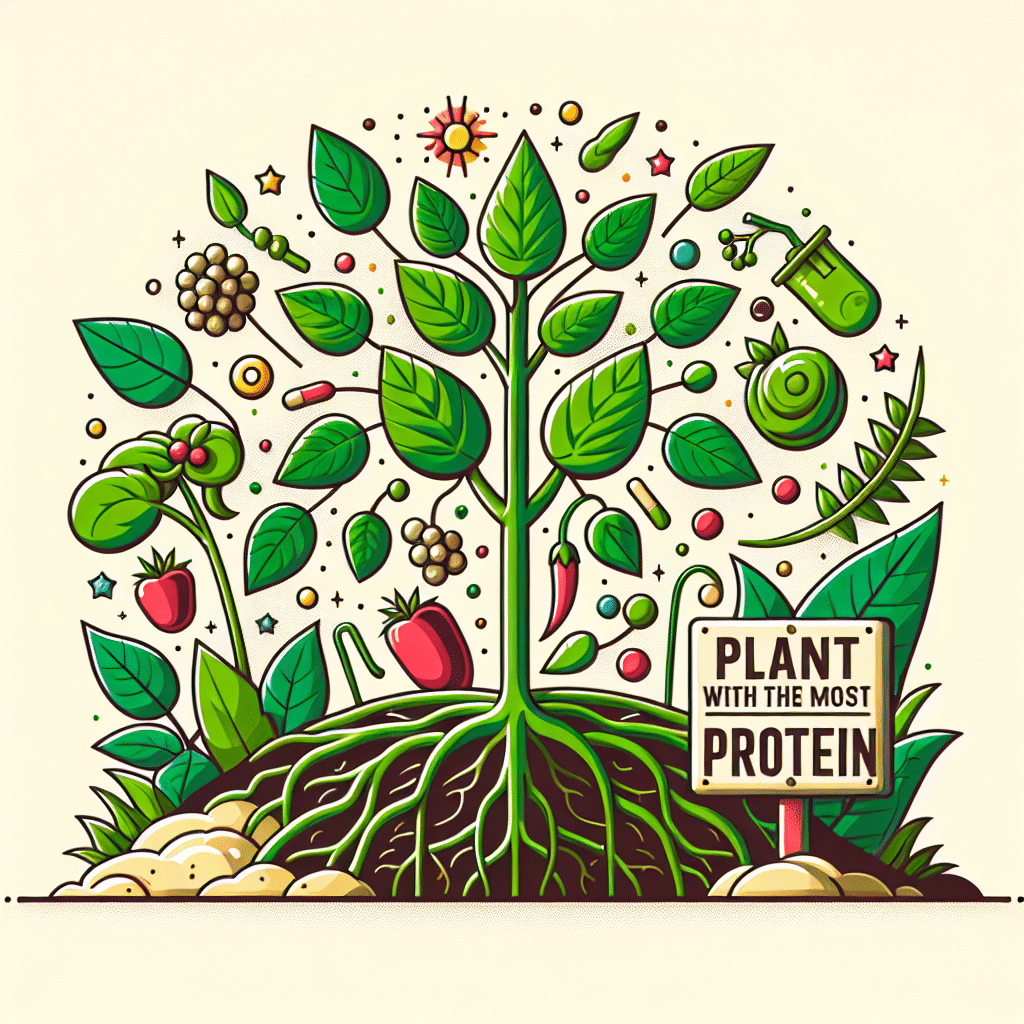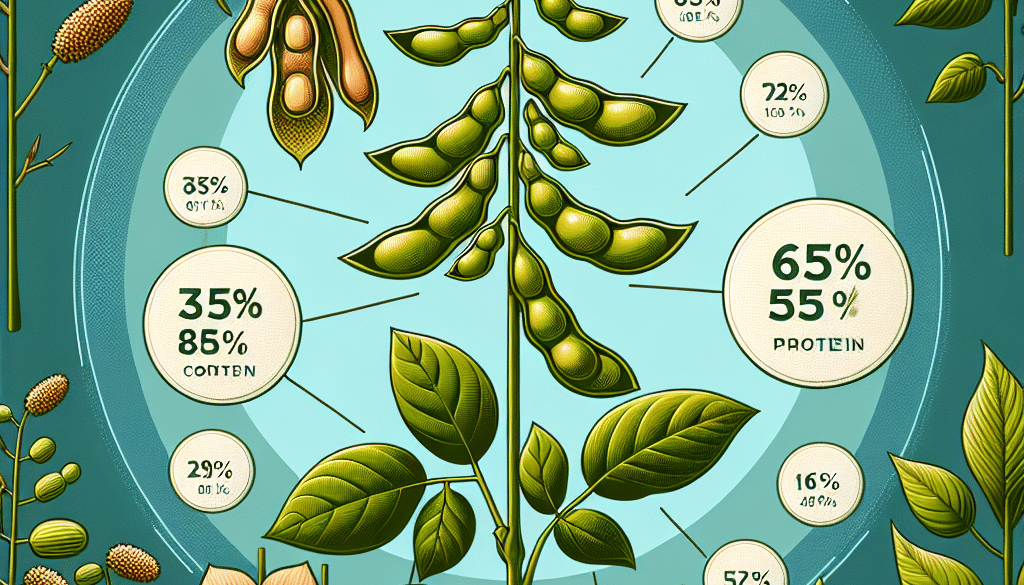What Plant Has The Most Protein?
-
Table of Contents
- High-Protein Plants: Discovering the Most Nutrient-Dense Options
- Understanding Plant-Based Proteins
- The Protein Powerhouse: Spirulina
- Other Notable High-Protein Plants
- Case Studies and Statistics
- Integrating High-Protein Plants into Your Diet
- Conclusion: Embracing Plant-Based Proteins
- Discover ETprotein’s High-Quality Plant Proteins
High-Protein Plants: Discovering the Most Nutrient-Dense Options

When it comes to protein, the common perception is that meat and animal products are the primary sources. However, plants can also be rich in protein, offering a plethora of benefits for those seeking a plant-based diet or looking to diversify their protein intake. In this article, we will explore which plant has the most protein and delve into the significance of plant-based proteins in our diets.
Understanding Plant-Based Proteins
Before we identify the plant with the highest protein content, it’s essential to understand what plant-based proteins are and why they’re important. Plant-based proteins come from a variety of sources, including legumes, grains, nuts, seeds, and vegetables. They are crucial for those following vegetarian or vegan diets and offer health benefits such as lower levels of saturated fat and cholesterol, as well as a higher intake of fiber and essential nutrients.
The Protein Powerhouse: Spirulina
When it comes to the plant kingdom, spirulina is often hailed as the most protein-dense. Spirulina is a blue-green algae that thrives in both fresh and saltwater. It is not only a protein champion but also contains a spectrum of vitamins and minerals, making it a superfood.
- Protein Content: Spirulina consists of about 60-70% protein by dry weight, which is exceptionally high compared to other plant sources.
- Amino Acid Profile: It contains all essential amino acids, making it a complete protein, which is rare for plant-based sources.
- Nutrient Density: Spirulina is rich in vitamins B1, B2, B3, copper, iron, magnesium, potassium, and manganese.
Despite its impressive nutritional profile, spirulina is typically consumed in small quantities due to its potent flavor. Therefore, while it has the highest protein content, it may not be the primary protein source in a person’s diet.
Other Notable High-Protein Plants
Aside from spirulina, there are several other plants that are high in protein and can contribute significantly to daily protein requirements.
- Lentils: Lentils are a staple in many cultures and provide about 18 grams of protein per cooked cup.
- Chickpeas: Also known as garbanzo beans, chickpeas offer around 15 grams of protein per cooked cup.
- Hemp Seeds: With about 10 grams of protein per 3 tablespoons, hemp seeds are a versatile protein source that can be easily added to various dishes.
- Quinoa: Quinoa is a complete protein and provides approximately 8 grams of protein per cooked cup.
- Almonds: Almonds contain about 6 grams of protein per ounce, along with healthy fats and fiber.
These plants are not only high in protein but also provide other essential nutrients and can be incorporated into a balanced diet in various ways.
Case Studies and Statistics
Research has shown that incorporating plant-based proteins into one’s diet can have significant health benefits. A study published in the American Journal of Epidemiology found that high intake of plant-based proteins was associated with a lower risk of mortality, particularly from heart disease.
Furthermore, the global demand for plant-based proteins is on the rise. According to a report by MarketsandMarkets, the plant-based protein market is projected to grow from USD 10.3 billion in 2020 to USD 14.5 billion by 2025, at a compound annual growth rate (CAGR) of 7.1% during the forecast period.
Integrating High-Protein Plants into Your Diet
Incorporating high-protein plants into your diet can be simple and delicious. Here are some ideas:
- Add quinoa or lentils to salads for a protein boost.
- Snack on almonds or blend hemp seeds into smoothies.
- Use chickpea flour to make protein-rich pancakes or baked goods.
- Include spirulina powder in energy bars or mix it into salad dressings.
By exploring various recipes and preparations, you can enjoy the benefits of these protein-rich plants in your daily meals.
Conclusion: Embracing Plant-Based Proteins
In conclusion, while spirulina stands out as the plant with the most protein, there are numerous other plant-based sources that can contribute to a high-protein diet. These plants not only offer protein but also a range of other health benefits. By incorporating a variety of protein-rich plants into your diet, you can enjoy a nutritious and sustainable approach to meeting your protein needs.
Discover ETprotein’s High-Quality Plant Proteins
If you’re looking to enhance your diet with high-quality plant proteins, ETprotein offers a range of products that cater to various needs. From organic rice protein to clear pea protein and beyond, their selection is characterized by a neutral taste, non-GMO, and allergen-free attributes. With L-(+)-Ergothioneine purity over 98%, ETprotein’s offerings are ideal for industries such as nutraceuticals, pharmaceuticals, and food and beverage. To explore their products and find the perfect plant-based protein solution for you, contact ETprotein today.
About ETprotein:
ETprotein, a reputable protein and L-(+)-Ergothioneine (EGT) Chinese factory manufacturer and supplier, is renowned for producing, stocking, exporting, and delivering the highest quality organic bulk vegan proteins and L-(+)-Ergothioneine. They include Organic rice protein, clear rice protein, pea protein, clear pea protein, watermelon seed protein, pumpkin seed protein, sunflower seed protein, mung bean protein, peanut protein, and L-(+)-Ergothioneine EGT Pharmaceutical grade, L-(+)-Ergothioneine EGT food grade, L-(+)-Ergothioneine EGT cosmetic grade, L-(+)-Ergothioneine EGT reference grade and L-(+)-Ergothioneine EGT standard. Their offerings, characterized by a neutral taste, non-GMO, allergen-free attributes, with L-(+)-Ergothioneine purity over 98%, 99%, cater to a diverse range of industries. They serve nutraceutical, pharmaceutical, cosmeceutical, veterinary, as well as food and beverage finished product distributors, traders, and manufacturers across Europe, USA, Canada, Australia, Thailand, Japan, Korea, Brazil, and Chile, among others.
ETprotein specialization includes exporting and delivering tailor-made protein powder and finished nutritional supplements. Their extensive product range covers sectors like Food and Beverage, Sports Nutrition, Weight Management, Dietary Supplements, Health and Wellness Products, and Infant Formula, ensuring comprehensive solutions to meet all your protein needs.
As a trusted company by leading global food and beverage brands and Fortune 500 companies, ETprotein reinforces China’s reputation in the global arena. For more information or to sample their products, please contact them and email sales(at)ETprotein.com today.












